Asia Stocks Rise As Focus Shifts From Risk Aversion, Aussie
Bareksa • 23 Jul 2014

Pedestrians walk past an electronic board showing the graph of the recent movement of Japan's Nikkei average outside a brokerage in Tokyo (REUTERS/Yuya Shino)
MSCI's broadest index of Asia-Pacific shares outside Japan rose 0.5 percent.
Bareksa.com - An index of Asian shares touched a fresh three-year high on Wednesday as some markets focused on company earnings more than geopolitical tensions while the Australian dollar spiked on stronger-than-expected inflation data.
But a cautious mood was expected to return in early European trade, where spreadbetters predicted Britain's FTSE 100 to open 8 to 15 points lower, or down as much as 0.2 percent; Germany's DAX to open down 20 to 22 points, or 0.2 percent lower; and France's CAC 40 to open 5 to 6 points lower, or down 0.1 percent.
"Despite yesterday's strong rebound in Europe, we look set to start on the back foot this morning after a slightly negative reaction to the latest earnings announcements from Microsoft and Apple, after the bell last night," Michael Hewson, chief market analyst at CMC Markets, said in a note.
Apple Inc posted a smaller-than-expected 6 percent rise in quarterly revenue, while Microsoft Corp MSFT.O said it aims to get its loss-making Nokia phone unit to break even within two years after it reported a 7 percent dip in quarterly profit.
Violence continued in Gaza, but hopes rose for an easing of tension in Ukraine after pro-Russian rebels handed the flight recorders and victims' remains from a downed Malaysian airliner to international authorities.
MSCI's broadest index of Asia-Pacific shares outside Japan rose 0.5 percent after earlier pushing to a three-year peak, lifted after the S&P 500 hit a new high overnight as risk markets turned their attention to positive corporate earnings and economic data.
In contrast, Japan's Nikkei stock average closed down 0.1 percent as the Tokyo markets kept their focus on tensions in Gaza and the Middle East.
In currencies, the Australian dollar, already on a bullish footing after the country's central bank chief on Tuesday chose not to talk down the currency, added about 0.4 percent to buy $0.9432. It spiked to a nearly two-week high of $0.9439 on surprisingly high core inflation figures that dented rate cut expectations.
"We think that the speculation regarding a near-term rate cut that we've seen over the past four to six weeks is likely to be dialed back to a certain extent," said Tom Kennedy, economist at JP Morgan in Sydney.
The euro stood little changed at $1.3467, after ticking down to a fresh eight-month trough of $1.3458 earlier in the session.
The weaker euro dovetailed with expectations for the European Central Bank to ease policy further with a gradual widening of interest rate differentials favouring the U.S. over Europe seen unfolding.
Still, market participants did not see a clear, specific trigger for the latest plunge.
"The only explanation for the sell-off in EUR/USD is a technical one. The currency pair has been in a downtrend and hovering near 1.35 for the past few days with speculators itching to test this key support level," Kathy Lien, managing director of FX strategy for BK Asset Management, wrote in a note to clients.
"In the long run, we believe EUR/USD should be trading comfortably below 1.35, but not until there is significant upside momentum in U.S. yields," she said.
U.S. Treasury yields fell overnight after benign U.S. inflation data suggested less pressure on the Federal Reserve to raise interest rates sooner than expected.
The dollar was nearly flat at 101.42 yen, having pulled back from the week's low of 101.19 hit on Monday as demand for the safe-haven Japanese currency diminished.
In commodities, gold held steady after falling on Tuesday as tensions over the Malaysian airliner downed over Ukraine eased.
Spot gold was little changed at $1,305.70 an ounce after falling as low as $1,301 overnight. It had climbed to as high as $1,324 late last week when the Malaysian airliner was brought down.
U.S. crude dropped about 0.3 percent to around $102 a barrel, falling for a second consecutive session as oil supplies were unaffected by continuing violence and tension in Iraq, Ukraine and Gaza. (Source : Reuters)